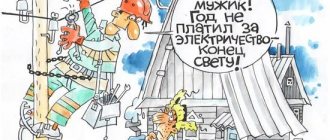Sometimes people experience illegal power cuts. This happens for various reasons and many do not know where to go to resolve the situation. Usually the reason for what happened lies in an accident on the line or is associated with a huge debt to utility companies. If the power line is damaged, you will have to wait until repairmen fix the problem. But when the lights are turned off due to non-payment, everything depends on the actions of the debtor himself.
Turning off the lights in an apartment or private house always brings great inconvenience, sometimes leading to serious consequences for residents Source homeurist.com
On what legal grounds are the lights turned off?
According to Russian law, it is allowed to stop the supply of electricity if debt has accumulated for two or more months. But before turning off the electricity, utility workers must notify the home owner in advance (at least 20 days in advance) about such a measure. If the user does not pay the entire debt within the given period, he receives a similar notice, which is issued against receipt. After this, the defaulter has three more days to repay the debt.
If the second warning is also ignored, the service provider has the right to stop supplying electricity to a specific address. But in practice, further actions are determined by the management company (management company), with which a long-term contract for the supply of electricity has been signed. Usually the latter contains information about mutual obligations. It also clearly states the measures taken in case of violation of the agreement by one of the parties.
The company does not have the right to prescribe clauses of the contract at its own discretion. They must be regulated by government decree No. 354 “On the provision of public services.” At the same time, the homeowner can appeal the organization’s decision when the supply of electricity is suspended without notice.
Disconnecting a consumer from the power grid is legally carried out subject to certain rules. Source vedomosti102.ru
Time frame for elimination
Consumers must be provided with an uninterrupted supply of electricity throughout the year. In accordance with clause 9 of Appendix No. 1 of Resolution No. 354, a break in the electricity supply is allowed for two hours if there are two independent mutually redundant power sources. The permissible duration of a power outage can be 24 hours with one power source.
An interruption in the supply of electricity is not allowed if this could lead to a shutdown of networks and equipment that belongs to the common property of an apartment building, ensuring the uninterrupted operation of in-house engineering systems and safe living conditions for citizens.
These deadlines apply to cases of planned repair work on power lines. They are prescribed in the agreement between the consumer and the utility service provider. Energy supply companies inform you in advance about the start of planned work (read more about the procedure for turning off electricity here, and you can find out more about the planned interruption of electricity supply here).
Regarding emergency situations requiring an unscheduled power outage, the legislation does not establish specific deadlines for repair work. In each specific case, the time frame for restoring power supply may vary. This depends on the complexity of the breakdown and the amount of resources to fix it. In the event of natural disasters (flood, hurricane, etc.), natural conditions also affect the period.
Electricity is one of the main household goods of modern society, and turning it off brings a lot of problems for residents. There may be several reasons for the shutdown, one of which is late payment for supplied energy resources. From our materials you will learn how to turn off the power for non-payment, the owner to refuse electricity supply, and also whether the chairman of SNT or the management company has the right to stop the supply of electricity - read in our materials.
Illegal power cuts
So that over time the actions of the management company are not recognized as unlawful, its employees must correctly carry out the procedure for suspending the supply of light. It is illegal in the following cases:
- Having debt for water or gas supply, but not for electricity.
- The debt has been fully repaid, evidence of its absence has been provided to the company, two days have already passed since the last date.
- Contractual terms were not met, and a violation of the law was established.
- According to the law, it is impossible to apply a rolling restriction of services. Neighbors who regularly pay their bills should not suffer because of non-payers.
- In winter, when houses are heated with electric appliances. Illegality threatens the health of residents.
- Disconnection from electricity to citizens from the socially vulnerable group.
- The organization does not follow the consistent procedure for turning off lights (due to non-payment) required by law.
The procedure for turning off the lights in case of debt
The management company has the right to interrupt the supply of electricity only in the established sequence:
- If a debt in the amount of two months' payment for electricity arises, a warning is sent to the defaulter.
- The debtor is given 20 days to repay the debt in full.
- If this does not happen, then after the expiration of the above period the defaulter must receive a correctly executed repeated notification.
- Three days after receiving the second notice, if the debt is not repaid, the supply of electricity may be stopped.
Lights are turned off by sealing electricity meters. If one of the above conditions is ignored, the homeowner can protest the organization’s actions and contact the relevant authorities. On the day the seal is installed, a company employee will certainly draw up a report indicating a power outage. The latter should contain the following information:
- address of the defaulter;
- degree of restriction of services (partial or complete);
- meter readings;
- when a shutdown does not occur, the reasons must certainly be indicated;
- exact time for completion of work;
- description of technical manipulations;
- grounds for suspending the supply of electricity;
- date of creation of the document, signatures of both parties.
The act is drawn up in several copies, one of which is left to the owner of the home. By signing such a document, the defaulter agrees that the supply of electricity was stopped legally.
Disconnecting a consumer from the power grid is usually done by sealing the electric meter Source perestroika.msk.ru
Procedure for turning off electricity for non-payment of utilities
Art. 119 in Resolution No. 354 provides for a strict procedure for cutting off electricity in case of non-payment within 20 days. Therefore, the performer must adhere to the procedure in order for the actions to be recognized as legal. At the slightest non-compliance, the consumer has the right to file a complaint against the actions of the contractor to the supervisory authorities or court. If the actions are found illegal, the performer will be required to pay a fine.
How to write a complaint against the Criminal Code?
Sample complaint against Energosbyt to the prosecutor's office for illegal blackouts
- Before disconnecting, a notification must be sent to the defaulter by any of the following methods:
- delivery in person against signature;
- by registered letter with notification, and the fact of receipt will be reflected in the notification.
- The debtor is then given 20 days, during which the debtor is obliged to repay the debt.
- If payments are not received, at the end of the established period, a restriction on electricity consumption is introduced for 10 days. Then it is turned off.
- If limited supply of light is not possible, electricity will be turned off after 30 days of non-payment. In this case, harm to everyone living in the house must be excluded, and damage to common property must also be prohibited.
At the moment of termination or limitation of the supply of a resource, an official document is drawn up - a power outage act, which indicates:
- date of actions taken;
- consumer data;
- address of the housing being disconnected;
- how the shutdown was made;
- meter readings indicating its number;
- grounds for stopping or limiting the supply of electricity;
- shutdown period.
An act is drawn up in three copies and after signing, one of them is handed over to the consumer.
How to fix the situation
To restore electricity supply, the home owner only needs to pay off the debt. This should be done as quickly as possible, otherwise a penalty will be charged.
Correct actions of the debtor:
- When a homeowner is convinced that he will not pay his light bill on time, he can exercise his right to receive a deferment. According to the law, the Criminal Code should not refuse him. As a result, a person gets the opportunity to avoid fines and forced power outages.
- If the electricity is turned off, you need to quickly collect the required amount to pay for the services received.
- Next, a receipt (proof of debt repayment) should be submitted to the management company, then write an application to restore the electricity supply.
- Connecting the light is a paid service, the amount is determined individually.
- Then you should contact the management company employees and agree on the removal of the seal.
If the above conditions are met, the organization is obliged to restore the supply of electricity within two days.
The only thing the homeowner will have to do to restore the supply of electricity is to pay off the debt. Source img-fotki.yandex.ru
Reconnection fee
You will have to pay to reconnect the lights. Some argue that housing and communal services representatives came up with this requirement. In fact, such a condition is reflected in the agreement; it complies with Russian legislation.
For individuals, the payment is about 1,000 rubles, while for legal entities, the resumption of services costs about ten times more. If additional costs arise during connection that exceed the above amounts, they are paid by the company itself.
Reconnecting electricity after it has been disconnected for debt can cost several thousand rubles Source cdn21.img.ria.ru
Responsibility for illegal power outages
Every homeowner should know in what cases stopping the supply of light without warning is considered legal. Then he will understand whether it is worth contacting law enforcement if a difficult situation arises.
The management company has the right to act without prior notification if:
- The owner of the home did not pay for electricity for more than six months.
- There is a high probability of an accident occurring.
- The controller did not have access to the electric meter for a long time, which resulted in a debt.
If an illegal power outage occurs without notice, the homeowner can file a claim and contact the district administration or prosecutor’s office. In addition, the victim has the right to report damage resulting from a lack of electricity.
Before contacting law enforcement agencies, the homeowner must understand in what cases turning off the lights without warning will be a legal measure Source perspektiva-ru.ru
For example, after the lights were turned off without warning, a person tripped and was injured, and food spoiled in the freezer. If there is evidence of what happened, the management company is obliged to pay monetary compensation (the amount is established by the court).
The liability that an organization must bear depends on the loss incurred. If an illegal power outage without notice results in damage to electrical appliances, administrative penalties apply. Additionally, homeowners have the right to receive compensation for moral damage.
Liability for unjustified termination of power supply to individual apartments
Administrative
Administrative liability may arise in situations where the shutdown was carried out without following a legal procedure (what is the procedure for turning off electricity?).
- You can refer to Article 19.1 of the Code of Administrative Violations. The actions of the electricity supplier will be regarded as arbitrariness, and the punishment will be a fine in the amount of 100 to 300 rubles, and for officials from 300 to 500 rubles.
- If the lights are turned off very often, then you can resort to Article 7.23 of the Code of Administrative Offenses. For officials, the amount of the fine will be from 500 to 1,000 rubles, and for legal entities from 5,000 to 10,000 rubles. But only if it turns out that there is a real violation of the standards for providing the population with electrical energy.
- If the energy company is a monopolist in the energy market, then in this case Article 14.31 of the Code of Administrative Offenses can be applied. It indicates abuse of its dominant position in the market. Punishment for officials in the amount of 15,000 to 20,000 rubles, and for legal entities from 300,000 to 1 million rubles.
Criminal
- Very often, illegal power cuts can be calculated in accordance with Article 330 of the Criminal Code as arbitrariness. This means that the person who is responsible for the failure of power supply must be subject to a fine or correctional labor. Arrest and imprisonment are permitted.
- Also, in accordance with paragraph 1 of Article No. 215.1 of the Criminal Code of the Russian Federation, if a power outage resulted in any damage, for example, harm to health and so on, then in this case a fine, correctional labor, or even imprisonment will be imposed.
- If a power outage caused the death of a person, the official will be held accountable to the law in accordance with paragraph 2 of Article 215.1 of the Criminal Code. The punishment will be forced labor and a ban on holding certain positions.











